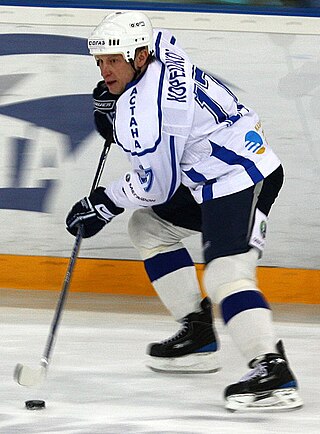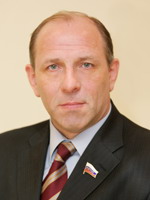
Ukraine competed at the 2004 Summer Olympics in Athens, Greece, from 13 to 29 August 2004. This was the nation's third consecutive appearance at the Summer Olympics in the post-Soviet era. The National Olympic Committee of Ukraine sent the nation's largest ever delegation to these Games. A total of 240 athletes, 125 men and 115 women, took part in 21 sports. Women's handball was the only team-based sport in which Ukraine had its representation at these Games for the first time. There was only a single competitor in modern pentathlon and taekwondo.

Russia competed at the 2004 Summer Olympics in Athens, Greece, from 13 to 29 August 2004. This was the nation's third consecutive appearance at the Summer Olympics as an independent nation. The Russian Olympic Committee sent a total of 446 athletes to the Games, 244 men and 202 women, to compete in all sports, except baseball, field hockey, football, and softball.

Croatia competed at the 2004 Summer Olympics in Athens, Greece, from 13 to 29 August 2004. This was the nation's fourth consecutive appearance at the Summer Olympics since the post-Yugoslav era. The Croatian Olympic Committee sent the nation's smallest delegation to the Games since its debut in 1992. A total of 81 athletes, 66 men and 15 women, competed in 14 sports. Men's water polo, and men's handball were the only team-based sports in which Croatia had its representation in these Olympic Games.

Russia, referred to by its formal name; the Russian Federation, by the International Olympic Committee, has competed at the modern Olympic Games on many occasions, but as different nations in its history. As the Russian Empire, the nation first competed at the 1900 Games, and returned again in 1908 and 1912. After the Russian revolution in 1917, and the subsequent establishment of the Soviet Union in 1922, it would be thirty years until Russian athletes once again competed at the Olympics, as the Soviet Union at the 1952 Summer Olympics. After the dissolution of the Soviet Union in 1991, Russia competed as part of the Unified Team in 1992, and finally returned once again as Russia at the 1994 Winter Olympics.

The Croatia national handball team represents Croatia in international men's team handball competitions and friendly matches. The handball team is controlled by the Croatian Handball Federation (HRS).

Kazakhstan's former long-term President, Nursultan Nazarbayev, has challenged sports organizers to engage 30 percent of the country's population in sports. The state has numerous sports clubs where people participate in various types of sports; sport facilities are available to the general public. Kazakhstan currently hosts major international tournaments; Astana and Almaty hosted the VII Asian Winter Games 2011, which drew teams from 27 countries.

The France national handball team is supervised by the French Handball Federation, and represents France in international matches. It is the first handball team to have held all three titles twice, and the only national team in its sport to hold six world titles and a total of eleven medals at the World Men's Handball Championship. With a total of five medals, including three gold in 2008, 2012 and 2021, France is also the most successful Handball team at the Summer Olympics. As of January 2024, they are the defending European Champions.
The Russia women's national handball team is the national team of the Russian Federation. It is governed by the Handball Federation of Russia and takes part in international handball competitions.
Sport in Romania is an important part of the country's culture. Romania has risen to prominence in a number of sporting areas in recent decades. Association football is the most popular sport in Romania, a nation of 20 million. The most successful club is Steaua Bucharest, who were the first Eastern European side to win the European Cup and the European Supercup in 1986. Romania is one of only four national teams from Europe that took part in the first World Cup in 1930. The Romania national football team has taken part in seven FIFA World Cups and had its most successful run during the 1990s, when they reached the quarterfinals of the 1994 FIFA World Cup, losing to Sweden in the penalty shootout. Romania was ranked third by FIFA in 1997.
Sport in Serbia includes football, basketball, handball, tennis, volleyball, and water polo. Professional sports in Serbia are organized by sporting federations and leagues. Serbian professional sports includes multi-sport clubs, biggest and most successful of which are Crvena Zvezda, Partizan, Radnički and Beograd in Belgrade, Vojvodina in Novi Sad, Radnički in Kragujevac, Spartak in Subotica. Serbia had successes in basketball, winning the Olympic silver medal and Nikola Jokic winning 3 NBA MVPs, as well as the 2023 NBA Championship and Finals MVP, Novak Djokovic winning a record setting 24th Grand Slam, and in handball, volleyball and water polo as well.

The most popular sport in Russia is soccer. According to Yandex search analysis results rating of the most popular sports among Russians: "Football topped the list of the most popular sports in Russia" with 5 to 10 million requests. Ice hockey came in second with handball, basketball, futsal, boxing, auto racing, volleyball, athletics, tennis, and chess rounding out the top ten rankings. Other popular sports include bandy, biathlon, figure skating, weightlifting, gymnastics, wrestling, martial arts, rugby union, and skiing.

Brazil sent a delegation to compete at the 2008 Summer Olympics in Beijing, China, in August 2008. Brazilian athletes have competed in every Summer Olympic Games since 1920, except the 1928 Summer Olympics. The country is represented by the Brazilian Olympic Committee. Brazil headed to the Beijing Games with its largest Olympic delegation at the time, 277 athletes, including 132 women.

The Russian Federation competed at the 2008 Summer Olympics, held in Beijing, China, represented by the Russian Olympic Committee. Russia competed in all sports except baseball, field hockey, football, softball, and taekwondo. It ranked third in the medal table by the number of gold (24) and overall (60) medals. Russia also had 14 medals stripped for doping violations, the most of any nation at the 2008 Olympics, although in terms of gold medals it got a net positive of +1.
Greece has risen to prominence in a number of sporting areas in recent decades. Football in particular has seen a rapid transformation, with the Greece national football team winning the UEFA Euro 2004. Many Greek athletes have also achieved significant success and have won world and olympic titles in numerous sports during the years, such as basketball, wrestling, water polo, athletics, weightlifting, with many of them becoming international stars inside their sports. The successful organisation of the Athens 2004 Olympic and Paralympic Games led also to the further development of many sports and has led to the creation of many world class sport venues all over Greece and especially in Athens. Greek athletes have won a total 169 medals for Greece in 17 different Olympic sports at the Summer Olympic Games, including the Intercalated Games, an achievement which makes Greece one of the top nations globally, in the world's rankings of medals per capital

The People's Republic of China, the previous host of the 2008 Olympics at Beijing, competed at the 2012 Summer Olympics in London, the United Kingdom, between 27 July and 12 August 2012. This was the nation's ninth appearance at the Summer Olympics since its debut in 1952. A total of 396 Chinese athletes, 171 men and 225 women, were selected by the Chinese Olympic Committee to compete in 23 sports. For the fourth time in its Olympic history, China was represented by more female than male athletes.

Spain competed at the 2012 Summer Olympics in London, from 27 July to 12 August 2012. This nation has competed in all but two Summer Olympic Games since its official debut in 1920. Spain boycotted two editions, the 1936 Summer Olympics in Nazi Germany and the 1956 Summer Olympics in Melbourne, as a protest against the Soviet invasion of Hungary. In 2012, the Spanish Olympic Committee sent the nation's smallest delegation to the Games since 1988. A total of 278 athletes, 166 men and 112 women, competed in 23 sports.

The Russian Federation competed at the 2012 Summer Olympics in London, United Kingdom, from 27 July to 12 August 2012. This was the nation's fifth consecutive appearance at the Summer Olympics as an independent nation. The Russian Olympic Committee sent a total of 436 athletes to the Games, 208 men and 228 women, to compete in 24 sports. For the first time in its Olympic history, Russia was represented by more female than male athletes.

Sport in Yugoslavia had a significant role in its culture and society. Team sports such as football, basketball, handball, volleyball and water polo had the biggest popularity. Of individual sports the most popular were tennis, athletics, alpine skiing, swimming, table tennis, ski jumping and chess. Yugoslavia made its debut at the Summer Olympics in 1920. Until its break up in 1992, it competed in 16 Summer and 14 Winter Olympic games and won a total of 87 medals in various summer and winter sports. Yugoslavia hosted its first and the only Winter Olympic games in 1984 in Sarajevo when Jure Franko won country's first Winter Olympic medal, silver in alpine skiing.

The 2017 Maccabiah Games, also referred to as the 20th Maccabiah Games, were the 20th edition of the Maccabiah Games. They took place from 4 to 17 July 2017, in Israel. The Maccabiah Games are open to Jewish athletes from around the world, and to all Israeli citizens regardless of their religion. A total of 10,000 athletes competed, a Maccabiah Games record, making the 2017 Maccabiah Games the third-largest sporting competition in the world. The athletes were from 85 countries, also a record. Countries represented for the first time included the Bahamas, Barbados, Cambodia, the Cayman Islands, Haiti, Malta, Morocco, the Philippines, Singapore, South Korea, and Trinidad. The athletes competed in 45 sports.
Handball has a rich history in Russia, dating back to the early 20th century when the sport was introduced to the country by European immigrants. However, it wasn't until the 1950s that handball began to gain popularity in Russia.











